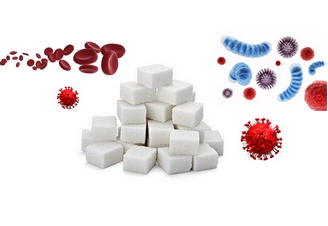by
Stepy —
March 18, 2020
- Sugar is in many foods and can be detrimental to our health when consumed too often.
- It has been linked to many ailments including heart disease, diabetes, candida, weak immune system, and cancer. According to the American Cancer Society, “About 1,660,290 new cancer cases are expected to be diagnosed in 2013, and in 2013 about 580,350 Americans are projected to die of cancer, almost 1,600 people a day.”
- In the United States, cancer is the second most common cause of death, just behind heart disease.
- Cancer has become an epidemic, and according to recent studies, sugar may be one of the biggest contributing factors to this deadly disease.
-
- University College London (UCL) study:
- UCL scientists have discovered a new method of detecting cancer by using magnetic resonance imaging (MRI) to map sugar consumption. This new technique is a huge breakthrough, because it is safer than techniques that use radiation. MRI’s also allow doctors to get a more detailed picture of tumors. This new technique is called ‘glucose chemical exchange saturation transfer’ (glucoCEST), and was put together by the belief that tumors consumed more sugar than normal tissues to sustain growth.
-
- According to Dr. Simon Walker-Samuel, the first author of the study: “GlucoCEST uses radio waves to magnetically label glucose in the body. This can then be detected in tumours using conventional MRI techniques. The method uses an injection of normal sugar and could offer a cheap, safe alternative to existing methods for detecting tumours, which require the injection of radioactive material.”
-
- The researchers found that setting an MRI to target sugar consumption made cancer cells in mice appear bright on the images, suggesting that they were consuming more sugar. This provides strong evidence that cancer cells do in fact feed on sugar.
-
- This study is very exciting news for the future of cancer research not only because is strengthens links of sugar to cancer, but because a wide variety of people can now be tested. UCL Professor Xavier Golay explains: “Our cross-disciplinary research could allow vulnerable patient groups such as pregnant women and young children to be scanned more regularly, without the risks associated with a dose of radiation.”
-
- The study has been published in Nature Medicine, and new studies are now in progress going further in depth to explore the links between sugar and cancer.
- Dr. Simon Walker-Samuel added this to sum it up best: “We have developed a new state-of-the-art imaging technique to visualise and map the location of tumours that will hopefully enable us to assess the efficacy of novel cancer therapies.”
- Our heartfelt gratitude goes out to the University College London for their brilliant work.
-
- For a cancer-fighting drink.
- For the top 10 cancer-fighting foods.
- For the dangers of aspartame.
- Note: None of the information in our website is intended to diagnose, treat, cure or prevent any illness or disease. The content on our website is for educational purposes only.
-
- REFERENCES
- 1. “Sugar Makes Cancer Light-up in MRI Scanners.” UCL.ac.uk. University College London, 7 July 2013. Web. 29 July 2013.
- 2. “Cancer Facts & Figures 2013.” Cancer.org. American Cancer Society, n.d. Web. 29 July 2013.
- 3. Walker-Samuel, Simon, M.D. “In Vivo Imaging of Glucose Uptake and Metabolism in Tumors.” Nature.com. Nature Medicine, 07 July 2013. Web. 29 July 2013.
-



















Pingback: The dangers of high fructose corn syrup - Step Into My Green World | STEPin2
Pingback: Raw chocolate mousse - Step Into My Green World | STEPin2